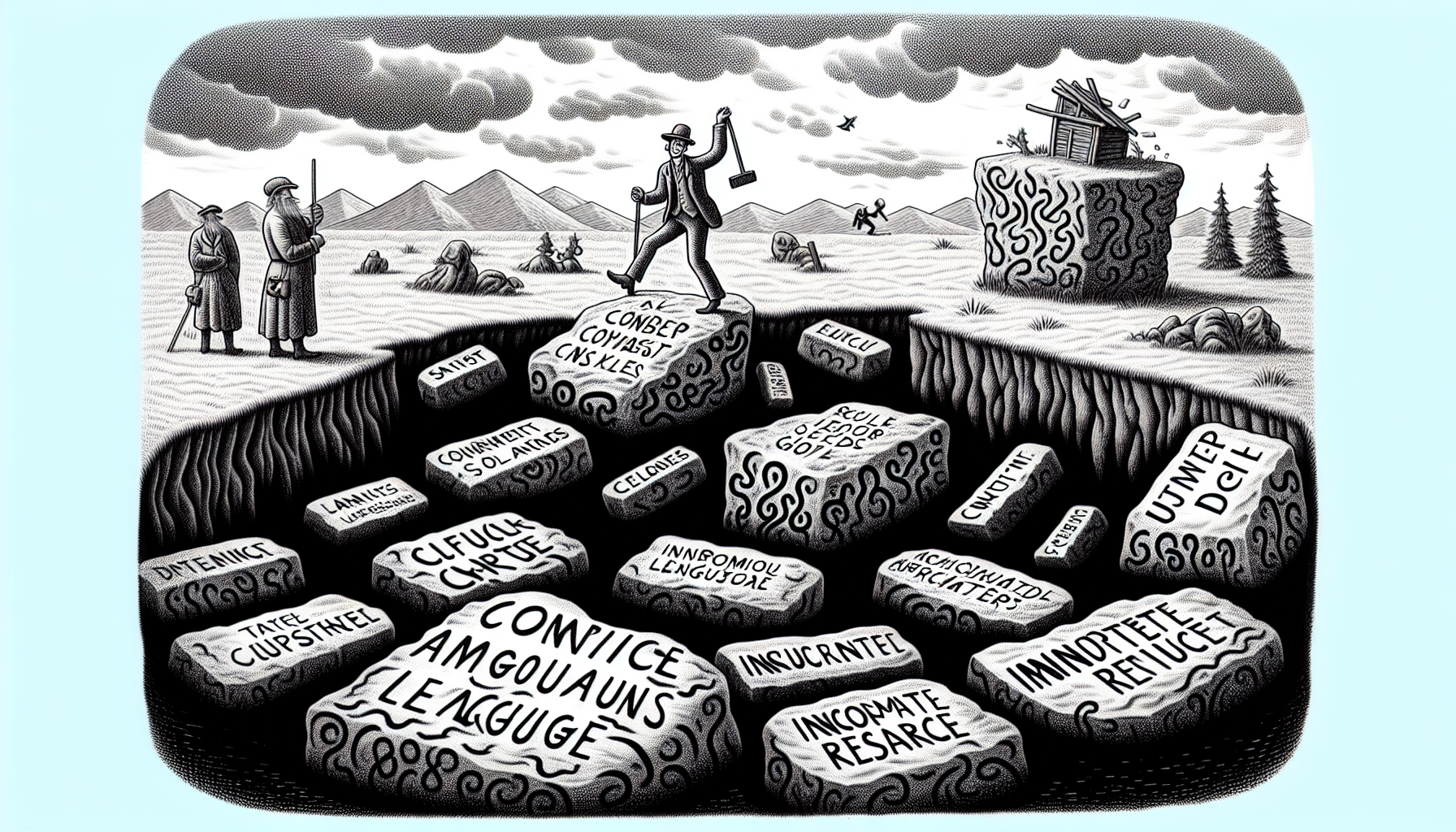Malcolm ZoppiWed May 08 2024
Essential Tips for a Thorough Contract Check Before You Sign
Ready to sign a contract? Stop—first, let’s perform a contract check together. This crucial step can be the difference between success and a legal nightmare. We’ll cut through the complexity and pinpoint the exact terms that require scrutiny, ensuring the deal you’re about to seal is in your best interest. Prepare to transform from novice […]
Ready to sign a contract? Stop—first, let’s perform a contract check together. This crucial step can be the difference between success and a legal nightmare. We’ll cut through the complexity and pinpoint the exact terms that require scrutiny, ensuring the deal you’re about to seal is in your best interest. Prepare to transform from novice to informed signer with our expert rundown on contract check.
Key Takeaways
Thoroughly reviewing a contract before signing is essential for identifying potential risks, ensuring clarity and legal compliance, preventing disputes, and safeguarding against severe financial implications.
Critical elements to check during a contract review include confirming the details of all parties involved, clearly defining scope and obligations, and specifying payment terms to avoid misinterpretation and potential conflicts.
Seeking professional legal assistance is valuable for interpreting complex terms, negotiating fair terms, ensuring legal compliance, and protecting interests before committing to legally binding contracts.
The Importance of a Contract Check

Any business transaction significantly benefits from a thorough contract review process. It involves a comprehensive reading and understanding of a contract before agreeing to its terms. Undertaking this process helps:
Uncover potential risks and consequences
Promote clarity and accuracy
Aid in conflict resolution
Guarantee satisfactory agreements.
Most contracts are designed to protect the interests of all parties involved, but only if they are thoroughly checked and understood. The contract review ensures that the contract not only meets the specific needs of your business, but also complies with current laws and regulations. Maintaining compliance helps avert unwelcome surprises in the future, like substantial legal fines or penalties.
Legal protection
It’s crucial to consult legal advice before you agree to a contract. Doing so allows for:
A check on the enforceability of terms and conditions, mitigating potential future disputes
A clear understanding of your responsibilities and rights
Minimized risk in entering an agreement that could be inequitable or detrimental.
Should contracts turn out to be non-binding, neither party can pursue legal action, which highlights why meticulous review is vital for ensuring an agreement is legally valid. It’s essential for agreements to have explicit mechanisms for resolving conflicts such as:
negotiation,
mediation,
arbitration,
or established plans for litigation.
To provide a structured approach should any disagreements arise under the law.
Avoiding disputes
The main goal of reviewing a contract is to sidestep potential disputes. Unclear wording in the contract can result in confusion and legal issues over how terms should be interpreted, which underscores the importance of having clear, explicit terms to circumvent such conflicts. A thorough review helps ensure that all involved parties have a complete understanding of their responsibilities, including aspects like timing constraints, conditions regarding payment, expectations for performance outcomes, and stipulations about ending the agreement.
Doing so prevents any party from agreeing to something impossible or burdensome—actions that could tarnish reputations and lead to avoidable disagreements.
To eliminate doubts within contract language by addressing any unfilled areas ensures there are no misunderstandings about what’s expected from each party under the contractual commitments. Taking this step avoids costly consequences that may arise from unclear provisions within the document. By doing so, you protect yourself from difficulties interpreting ambiguous clauses and forestall subsequent problems stemming from those interpretations.
Financial implications
Overlooking the importance of a detailed contract review may bring about significant financial harm. If businesses do not examine their contracts closely, they risk agreeing to terms that are not aligned with their interests, which can interrupt negotiations and result in adverse financial outcomes. Ineffectively handling intricate agreements might lead to confusion, mistakes, and inconsistencies that leave businesses vulnerable to monetary risks and diminished profits.
If management of contracts is insufficient, it could mean overlooked payments or accumulation of fines as well as fostering conflicts—all having detrimental fiscal consequences for companies involved. When organizations neglect to integrate legal requirements such as GDPR into their contract language—or fail to follow them—this oversight can incur heavy fines and tarnish an organization’s reputation.
Essential Elements to Review in a Contract

With the significance of contract checks established, the focus now shifts to the key elements that need to be reviewed in a contract. Some of these elements include the parties involved, the scope and obligations, and the payment terms and conditions. These are the building blocks that form the foundation of most contracts and are thus critical to the contract review process.
Risk allocation within a contract needs to be balanced between the parties, with clear remedies and recourse defined for handling breaches or unfulfilled promises. It is also crucial to utilize precise language to prevent legal disputes and misunderstandings, ensuring that attached reference documents are thoroughly reviewed for additional critical details.
Parties involved
The process of reviewing a contract kicks off by confirming the identities and specifics of all involved parties in the contract. This initial phase is essential to ensure the accuracy and enforceability of the agreement, especially if there’s a legal dispute later on. Ensuring that you have verified legal names, addresses, and other relevant information about each party is important.
Being aware of exactly who you are entering into an agreement with not only enhances your ability to enforce said contract, but can also help identify potential issues early on before they evolve into larger complications. With knowledge regarding all participants in the deal, you’re more equipped to safeguard your interests and plan for any unforeseen circumstances that may arise during or after review.
Scope and obligations
The scope of work is a crucial element within any contract, delineating enforceable details such as deliverables, schedules, and financial terms. For an effective depiction of the work’s breadth, it is imperative that the agreement speaks directly to specific business imperatives and goals. This includes addressing considerations like obtaining value for money spent, post-sale support quality levels provided by warranty coverage duration, and evaluating total costs over the product’s lifespan.
It is also essential to precisely define each party’s responsibilities within the contract while setting out clear provisions for instances when those obligations are not met. By doing so, all involved parties recognize what repercussions may arise from unmet duties. The distribution of risks must be addressed in a manner which equitably shares them among parties—this practice safeguards their respective interests by ensuring there’s an equilibrium in contractual commitments on both ends.
Payment terms and conditions
It is essential that contracts meticulously specify the terms of payment for services or goods, including the specific amounts and when they are due. Such precision affords both parties a clear understanding of their fiscal responsibilities and aids in financial planning. It’s important for contracts to spell out what happens if payments are late. This includes provisions granting entitlement to recover interest as well as any legal expenses incurred.
Ensuring that all aspects concerning monetary risks within payments have been carefully considered during a contract check promotes an equitable distribution of these risks among the involved parties. Effective control over intricate contractual agreements demands vigilant oversight over performance and the prompt gathering of rebate earnings where applicable. This diligent strategy helps guarantee adherence by all concerned entities to their respective payment duties, thereby reducing potential disputes related to monetary issues once thorough verification has occurred through a contract checked.
Seeking Professional Assistance

Engaging legal counsel prior to endorsing a contract may enhance your understanding and safeguard your position in several ways.
Demystify intricate contractual language
Confirm adherence to the law
Support negotiations aimed at securing favorable provisions
Highlight terms that are unclear or detrimental
Propose modifications for better protection of personal interests
A thorough legal examination can shed light on potential business consequences, allowing you to proceed with greater awareness.
Involving an attorney in reviewing a document could lead to numerous benefits, including:
Reduced exposure to risk through pinpointing possible liabilities
Assurance that one’s rights remain intact unintentionally foregone
Compliance with pertinent legal statutes and norms
Fortified standing legally when confrontations over contracts arise
Recommendations on how conflicts might be resolved effectively
Counsel concerning suitable remedial actions under the law
Prior consultation from someone knowledgeable about the laws relevant may act as a shield for what’s important to you by ensuring all aspects of your agreement adhere strictly within permissible boundaries.
Complex agreements
Multifaceted contracts that carry significant consequences require a thorough understanding and specialized knowledge. Attorneys play an essential role in the following aspects:
Deciphering intricate terms of a contract
Confirming that every party involved has a comprehensive grasp of what those terms entail
Offering expert legal counsel
Aiding parties in making choices based on sound information
Guaranteeing the effective fulfillment and favorable results stemming from complex agreements.
Securing the services of a legal professional offers critical insight into navigating sophisticated agreements, alerts you to possible hazards, and ensures your interests are safeguarded within the confines of a legally binding contractual engagement.
Negotiating terms
The art of negotiating a contract’s terms demands adeptness and proficiency. During the contract review, it is essential to distribute risk equitably to adjust or hash out details effectively, aiming for equilibrium among all involved entities. Typically, this process enlists involvement from the sales representative, their counterpart in negotiations, and a legal advisor – with lawyers playing an integral part in safeguarding their client’s interests through meticulous negotiation.
Securing a contract that has been expertly negotiated can lay down the foundation for flourishing business relations by guaranteeing mutual satisfaction regarding stipulations and provisions within said contract. Bear in mind that successful negotiation isn’t about declaring victory or conceding defeat. Rather it seeks harmonious resolutions serving everyone’s benefits.
Gaffney Zoppi’s services
Reviewing and negotiating contracts is an essential business practice, and engaging the expertise of professionals such as Gaffney Zoppi can be highly advantageous. This firm excels in providing lawyer services that focus on the creation and examination of contracts to suit the individual needs of a diverse range of clients including entrepreneurs, company owners, investors, and various organizations who reap benefits from custom-crafted agreements designed to address their specific business objectives.
Committed to efficiency in delivering contract-related services, Gaffney Zoppi promises rapid turnaround times coupled with exceptional client service—evident through their prompt email responses and assurance that phone calls will be returned within a day’s time. Clients are also offered transparent fixed-rate billing for these legal services by the firm, which eliminates concerns about unforeseen expenses.
For those interested in taking advantage of Gaffney Zoppi’s offerings or seeking information regarding engagement terms, they can do so via their website. The firm guarantees swift replies to any inquiries received there.
Common Contract Pitfalls to Avoid

It is essential to avoid potential problems, especially when it comes to contracts. Carefully scrutinizing the specifics of a contract is crucial because any negligence could lead to substantial misunderstandings and complications down the line. A review process that lacks efficiency or does not include appropriate teams in understanding contractual terms may cause difficulties after signing.
Overlooking rigorous checks during the review phase of contracts can result in mistakes, missed details, and discrepancies which might bring about excessive liabilities or violations of policies. If termination clauses and renewal conditions are not properly reviewed, there’s a risk of unintentionally committing to an agreement for a more extended period than planned.
Ambiguous language
Reviewing a contract is crucial for identifying any unclear or ambiguous provisions that could lead to misinterpretation and disputes. This process helps highlight areas that may inadvertently transfer risk, thereby averting potential misunderstandings.
During the negotiation phase of a contract, it’s imperative to communicate in a clear and succinct manner. This ensures both parties fully grasp all the key terms and concepts involved in the agreement.
To prevent future conflicts, paying close attention to eliminate any ambiguity during the review of contracts is important. Clarity reigns supreme when dealing with contractual agreements—ensuring certainty for all parties involved.
Missing clauses
The lack of specific clauses within a contract can lead to misunderstandings and potential disputes. It’s crucial that termination provisions be included in order to manage instances such as contractual breaches, non-payment or bankruptcy situations. Having clear dispute resolution clauses is imperative for defining the procedures for negotiation, mediation or arbitration in case conflicts arise.
Indemnification clauses play an essential role by delineating who bears responsibility for losses and to what degree. During the review process of a contract, it’s important to explicitly state payment-related obligations and deadlines so as to ensure timely pay execution while avoiding ambiguity. It’s also necessary to carefully handle blank spaces in contract templates. If they are not correctly completed or omitted before finalizing the agreement, negative repercussions may ensue.
Inadequate research
Neglecting to adequately investigate before making contract decisions can lead to regrettable outcomes. A lack of thorough due diligence regarding the other party may culminate in business agreements with those known for non-compliance or poor business conduct. Comprehending current market movements, the specifics within a contract, and who you are negotiating against – including their historical contracts and approaches to negotiation – is critically important.
In-depth research provides you with an accurate understanding of the situation at hand and provides you with essential information required not only to negotiate proficiently but also safeguard your interests throughout the negotiation process.
Tips for a Successful Contract Negotiation

Grasping the significance of contract review and being aware of typical mistakes paves the way for guidelines on effective contract negotiation. Essential to a successful bargaining session is thorough preparation, which encompasses recognizing what’s at risk, comprehending the potential hazards, and having clarity about your goals as well as what you wish to achieve from the agreement.
No matter if you’re experienced or new in this arena, these strategies offer crucial perspectives that can guide you through negotiating tactics enabling both parties involved to arrive at an agreement that serves their mutual interests.
Establishing goals
Before entering into negotiations, it is crucial to set clear objectives and priorities. One must understand what compromises they are willing to make as well as recognize the non-negotiable elements that may be deal breakers. It’s essential to assess your Best Alternative To a Negotiated Agreement (BATNA) and grasp the Zone Of Potential Agreement (ZOPA), which are fundamental in gauging both your negotiating leverage and the potential areas of agreement.
As part of preparation for contract negotiations, one should adhere to these strategic steps:
Clearly outline your key goals, expectations, demands, alongside core terms and conditions that you consider firm before initiating any discussions regarding the contract.
Dedicate time towards comprehending not only your own interests but also those of the opposing party.
Through rigorous preparation and understanding mutual interests better outcomes can be achieved from negotiation endeavors ultimately assisting in fulfilling stated objectives.
Communication
During the negotiation of contracts, it is essential to foster a sense of mutual comprehension and productive exchange through active listening and balanced dialogue. Consider these strategies.
Prioritize shared objectives and collective interests over rigid stances
Promote collaboration by incorporating inclusive language such as “we” and “us”
Engage in active listening to demonstrate your involvement and interest within the discourse
Adopting these methods can lead to more effective negotiations.
Keep in mind that adopting a willingness to compromise during negotiations doesn’t denote surrender, but rather contributes constructively towards reaching agreements that are advantageous for all parties involved.
Documentation
Documenting every agreement and adjustment negotiated is essential for preventing future conflicts and misunderstandings. Implementing a thorough workflow for contract review and approval is key in this procedure. Utilizing tools that allow for contract review directly within the browser can offer an adaptable, real-time method to record these amendments.
Having the ability to return to previous iterations of a document means all alterations are meticulously recorded, averting possible disagreements. It’s important to remember that comprehensive documentation forms the foundation of any contract by guaranteeing responsibility and clear understanding regarding all terms agreed upon.
Summary
To summarize, the importance of contract review should not be underestimated. It acts as a safeguard against legal issues, helps prevent disagreements between parties involved and protects from potential monetary consequences. When you possess a thorough knowledge of the fundamental components within contracts—clarity regarding all participants involved, precise definition of responsibilities and scope, along with equitable financial terms—you are in a stronger position to confirm that these aspects are fairly represented.
Contracts can indeed present complexities which might necessitate expert guidance. Employing specialists such as those at Gaffney Zoppi could significantly assist in meticulous contract examination and effective negotiation proceedings. By circumventing frequent errors like unclear wording or omission of essential clauses and by conducting extensive research prior to agreement commitments, one is better prepared for endorsing an accord that provides mutual advantages for everyone signing it.
Frequently Asked Questions
Why is it important to review a contract before signing?
Before you sign a contract, it’s crucial to thoroughly examine it in order to grasp your responsibilities and duties, confirm adherence to legal standards, and reduce the possibility of upcoming conflicts or monetary consequences. Taking this step is vital for safeguarding your interests.
What are some key elements to review in a contract?
When scrutinizing a contract, it is essential to assess the parties involved, examine the extent and duties stipulated within the agreement, as well as evaluate the terms and conditions related to payment. These critical components contribute to transparency and comprehension between those bound by the contract.
How can professional assistance be beneficial in contract review?
Enlisting professional help for contract review can greatly benefit businesses by providing clarity on intricate clauses, enhancing the negotiation of more favorable conditions, and guaranteeing adherence to legal standards.
What are some common pitfalls to avoid in contract review?
When examining a contract, it is essential to use clear language, include all necessary clauses, and conduct thorough research on the other party in order to avoid prevalent mistakes that could result in future legal complications.
How can Gaffney Zoppi’s services help in contract review and negotiation?
The services offered by Gaffney Zoppi include expert contract review and negotiation, handled by specialized lawyers. Their approach emphasizes rapid response times, clear communication with clients, and the provision of these services at competitive fixed rates.